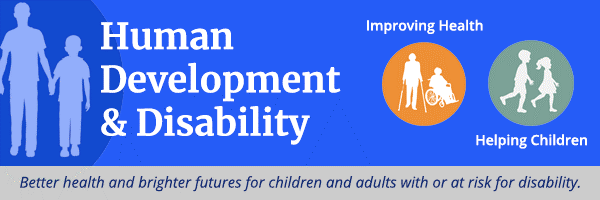DHDD Newsletter – May 2021

A Note from the DHDD Director:
Dear DHDD colleagues –
I hope you are all well and healthy. As you know, new COVID-19 guidance for fully vaccinated people was released late last week. CDC is working hard to ensure that our web content is up-to-date and reflects the new recommendations. I know some of you might have questions about how this new guidance impacts the communities we serve. As more information becomes available, it will be posted to the CDC COVID-19 web pages, so please refer to those as needed. We also have some new resources on COVID-19 vaccination developed for people with IDD who have extreme low literacy and their caregivers, as well as new Easy to Ready information and ASL videos. Please see more information on those resources in the newsletter below.
Best,
Georgina
In the Spotlight
Children’s Mental Health Awareness

May is mental health awareness month. Mental health of parents and children is connected in multiple ways. Parents who have their own mental health challenges, such as coping with symptoms of depression or anxiety (fear or worry), may have more difficulty providing care for their child compared to parents who describe their mental health as good. Caring for children can create challenges for parents, particularly if they lack resources and support, which can have a negative effect on a parent’s mental health. Parents and children may also experience shared risks, such as inherited vulnerabilities, living in unsafe environments, and facing discrimination or deprivation.
Parents need support, which, in turn, can help them support their children’s mental health. CDC works to make sure that parents get the support they need.
Is Your Child Who is Deaf or Hard of Hearing Ready for Kindergarten?

May is Better Hearing and Speech Month. A recent CDC publication found that receiving early intervention services before 6 months of age can help children who are born deaf or hard of hearing (D/HH) get ready for kindergarten.
The Joint Committee on Infant Hearing recommends that all infants are screened for hearing loss before 1 month of age, have a full hearing test before 3 months of age if they don’t pass the hearing screening, and are enrolled in early intervention (EI) before 6 months of age if they are diagnosed with hearing loss.
When identified soon after birth, babies who are D/HH can begin intervention early and are more likely to achieve language, cognitive, and social development on par with typically developing peers.
Parents, healthcare providers, and public health professionals can work together to make sure that all babies who are born D/HH receive the services they need on time to develop the competencies and skills that every child needs to thrive during kindergarten and beyond.
CDC and Special Olympics: Inclusive Health

May is National Physical Fitness and Sports Month. Physical activity is the cornerstone of good health. However, less than half of U.S. adults with disabilities meet the recommended physical activity guidelines.
Read our recently published feature to learn how CDC is working with Special Olympics to increase participation in year-round wellness programs among people with intellectual disabilities—a term used when a person has certain difficulties with thinking, learning, remembering, and reasoning.
New Resources
CDC COVID-19 Upcoming Partner Events & Updates
CDC COVID-19 ASL Videos Now Available Online
New CDC COVID-19 American Sign Language (ASL) videos have posted to CDC’s #COVID-19 ASL playlist. Video topics include Precautions for Direct Service Providers, Providing Support for People with Developmental and Behavioral Disabilities, and Contact Tracing, What to Expect.
The resources above were created in partnership with the Center for Inclusive Design and Innovation at Georgia Tech, and supported by a grant from the CDC Foundation. More information about this project and additional accessible COVID-19 resources including “Easy to Read” materials and braille can be found on the microsite hosted by Georgia Tech.
FAQs About COVID-19 Vaccines that People with Disabilities Should Consider

Join Georgia Tech’s Center for Inclusive Design and Innovation for their webinar on FAQs About COVID-19 Vaccines that People with Disabilities Should Consider
Wednesday, May 26, 2021
3:00PM to 4:00PM ET
Registration Link
**Registration for this webinar will close one hour before the live webinar at 2 p.m. EDT on Wednesday, May 26.**
New Training for Special Supplemental Nutrition Program for Women, Infants, and Children (WIC) Staff

The Learn the Signs. Act Early. team, in partnership with the Association for Public Health Nutritionists (ASPHN) has developed a training for WIC staff that focuses on the crucial role that WIC providers play in the health and wellbeing of children. The purpose of this 30-45 minute module is to help WIC staff learn what developmental milestones are, how they can empower parents to monitor their child’s development, and how to support families in offering a referral for screening or other services if there is a concern.
This training is open to any WIC staff and available on ASPHN’s website: Introduction to Child Development and Resources from CDC’s “Learn the Signs. Act Early.” Program – ASPHN
New Resource: “Milestones Matter with CDC and Vroom” Poster

NCBDDD is excited to announce the release of a new poster from CDC’s Learn the Signs. Act Early. and Vroom, a global program of the Bezos Family Foundation. This new poster shares the importance of tracking a child’s development and using brain building tips to add learning to everyday moments.
Visit the Learn the Signs. Act Early. materials webpage to download and print the English and Spanish versions of the poster.
Connecting with SSA on SSI Program

The Social Security Administration (SSA) is asking for your help to spread the word to parents, guardians, and caregivers as well as educators, community leaders, health care and other service providers, about potential financial assistance for children with disabilities.
The Supplemental Security Income (SSI) program helps children with qualifying disabilities by providing critical financial assistance. Children with disabling medical conditions—whose families meet certain income and resource limits—can receive SSI from birth until age 18. You and your clients can learn more about the SSI program in the publication, Benefits for Children with Disabilities.
SSA has put together a partner toolkit for you to share with your clients. In this toolkit you will find
- An email message to share with your clients.
- Articles you can post on your blog.
- Social media posts.
- Images for use in social media.
Publications
Legacy for Children™ Parenting Program Shows Benefits through Third Grade

A new paper published in the Journal of Developmental and Behavioral Pediatrics examined the long-term impact of the Legacy for Children™ parenting program, a group-based intervention to promote positive parenting among mothers facing economic hardship. Previous studies showed that children’s cognitive development benefited from their mothers’ participation in Legacy through third grade. Moreover, at age 5, children of mothers who participated in the Legacy program were less likely to have clinically significant behavioral concerns.
The new paper examined behavioral and socioemotional findings through third grade, 4 to 6 years after the intervention. The results indicated that some of these gains in behavioral and socioemotional development observed at age 5 were sustained through 3rd grade at one of the study sites. Group-based positive parenting interventions such as Legacy may have a sustained impact on children’s behavioral and socioemotional development several years after intervention completion, but it will be important to understand differences between study sites.

